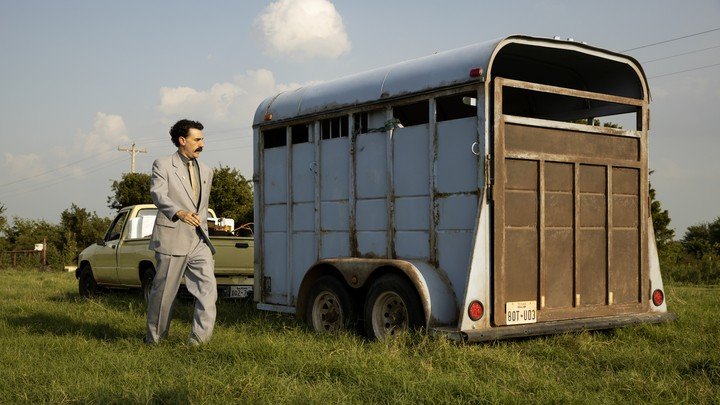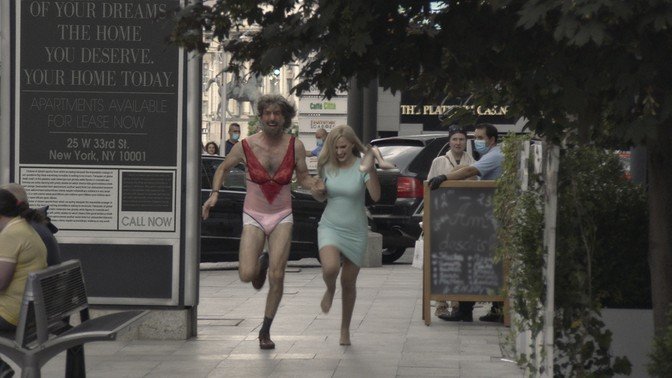
The New Borat Movie Is Less a Satire Than an Exposé

In 2020, Borat has become the peacekeeper rather than the agitator.
By now, you’ve probably heard about the already infamous climax of Borat Subsequent Moviefilm, the Amazon sequel that heralds the return of the titular Kazakh journalist and agent of chaos played by Sacha Baron Cohen.
Borat’s daughter, Tutar, is interviewing Rudy Giuliani in a hotel room when the situation takes an alarming turn: The former Mayor of New York, and current lawyer to the president, is shown reclining on a bed and reaching his hand into his pants. The whole scene is so cringe-inducing that it’s a relief when Borat himself bursts into the room, interrupting the encounter and jolting the tone from creepy dread back to zany confusion.
“She’s 15. She’s too old for you,” Borat tells Giuliani, a typically tasteless rejoinder from America’s favorite faux-foreign mischief-maker. (While Tutar, the character, is 15, the actor playing her is 24.)
As absurd and embarrassing as the hotel meeting is for Giuliani, who called the scene “a complete fabrication,” it underlines the accidental premise of the movie, which was shot surreptitiously over the course of this year.
When Borat first rampaged through the United States for his 2006 cinematic debut, he held up a fun-house mirror to Americans’ views of outsiders, capturing real people nodding and smiling politely at this supposed journalist and his provocations. But in 2020, Borat has become the peacekeeper rather than the agitator.
Borat, a bumbling caricature of a foreigner who possesses many wildly racist, sexist, and anti-Semitic viewpoints, was initially introduced as a side character for Cohen’s popular Da Ali G Show in Britain. Ali G (a dim but confident white man pretending to be Black) was Cohen’s breakout character in the UK, but Borat made the comedian a superstar in the U.S. While Ali G existed to mock a specific type of Brit, Cohen’s performance in 2006’s Borat offered a weirdly universal blend of shock-jock jokes, Chaplinesque physical humor, and blithe innocence.
At a time when America was embroiled in two wars in the Middle East, he became a perfect foil for its sins as he wandered around the country, eliciting both suspicion and reflexive politeness with his outrageous tactics.
The character resonates differently in the age of Trump. The current president’s emphasis on macho bravado, as well as his affinity for strongman dictators, is a real-life incarnation of Borat’s deeply misogynistic perspective (Borat refers to him as “a magnificent new premier named McDonald Trump”).
The early part of the film emphasizes that admiration, as Borat delivers a gift to Mike Pence on behalf of Kazakhstan. But the movie eventually abandons that focus, probably for the same reason that so much satire about the president doesn’t land: Trump is a more comically outsize figure than even a living cartoon character like Borat.
Does this mean that Borat, after a 14-year break from movies, is no longer funny? Certainly not, especially if you already enjoy the character and think back on the previous movie fondly. Most of the film is about the unwitting strangers Borat crosses paths with, people who react to his antics with confusion, or (sometimes) tacit approval.
He asks an animal-cage salesman for a portable jail to trap his daughter in; he makes a local bakery inscribe a cake with an anti-Semitic slogan. As usual, he’s given the familiar baffled looks and courteous chuckles; as usual, he’s never shown being rejected.
When Borat Subsequent Moviefilm addresses the coronavirus pandemic and the meeting with the president’s lawyer, it becomes less of a satire and more of a straight-up exposé. Borat, arguably, starts actually doing his job as a journalist-shining a light on the darkest corners of society and revealing them for what they are. By this point in the film, if you’re laughing, it’s likely in slack-jawed horror.
I watched the Giuliani segment with hands over my eyes, stupefied by the imbecility on display (before accompanying Tutar to a hotel room and placing his hand on her back, Giuliani also claims that China created the coronavirus in a lab). In another sequence, Borat takes shelter with a group of friendly conspiracy theorists who educate him on some of their latest ideas, such as Hillary Clinton’s love of drinking children’s blood. One memorable scene in the first Borat saw him leading a rodeo crowd to cheer the idea that George W. Bush drinks children’s blood. In the sequel, he doesn’t even have to plant the idea.
Our political discourse is so poisoned that Cohen doesn’t really seem to be exposing anything surprising. This problem has plagued many of his recent comedy efforts, including his 2018 Showtime series Who Is America?
In that, he played new characters doing the same shtick (capturing real-life idiocy under the guise of a docudrama), but it lacked the punch of his earlier work, merely confirming that America’s radical fringe had gotten a lot less fringe-y in the past decade. When the president is defending white nationalists and failing to denounce QAnon, Cohen doesn’t have to look hard to find people willing to say alarming things on film. He isn’t holding up a twisted mirror to society anymore; he’s just holding up a camera.
Borat Subsequent Moviefilm also has a more practical problem: So many people now know who Borat is. In one particularly funny montage, passersby excitedly approach him on the street demanding autographs and selfies; the sequence is worth watching in tandem with the beginning of the first movie, when Borat’s attempts to shake hands with random New Yorkers were greeted mostly with screams or threats of physical violence.
Cohen and his coterie of writers (eight people are credited with the screenplay) weave Borat’s popularity into the sequel’s “plot,” showing how his fame as a Kazakh laughingstock has fueled his hometown’s enmity for him.

The movie’s best moments are the fully scripted ones between Borat and Tutar, who have a genuinely sweet bond forged mostly through crude humor. Cohen seems to understand that the film’s shock value is automatically lower because of how deadened audiences have grown to political satire, so he relies more heavily on sitcom jokes to compensate and largely succeeds.
Much of the candid-camera material, in contrast, drags, and the film’s most interesting moment (aside from Giuliani’s humiliation) actually comes when Cohen breaks character mid-stunt.
Late in the movie, Borat visits a synagogue dressed as an awful anti-Semitic stereotype (a devil-like figure with a giant nose); members of the congregation start interacting with him, including a Holocaust survivor who quickly sways his usual denialism with her own passionate, personal recollections. Their conversation swerves into civility, and the movie cuts to them eating a meal together.
Cohen apparently stopped filming to explain what was going on to the woman, who receives a dedication at the end of the movie; it is a telling sign of how the boundaries of his humor have shifted—this notorious provocateur seems to understand that satirizing Holocaust denialism would do more harm than good in 2020.
That’s the curious conflict at the heart of Borat Subsequent Moviefilm. The world is more unhinged and surreal than when Cohen first emerged as a comedian, but even he recognizes the limits of make-believe right now. If in 2020, Borat can run screaming into the same room as Rudy Giuliani and come off as more sane and levelheaded, then his anarchic personality may have finally reached its apex.










